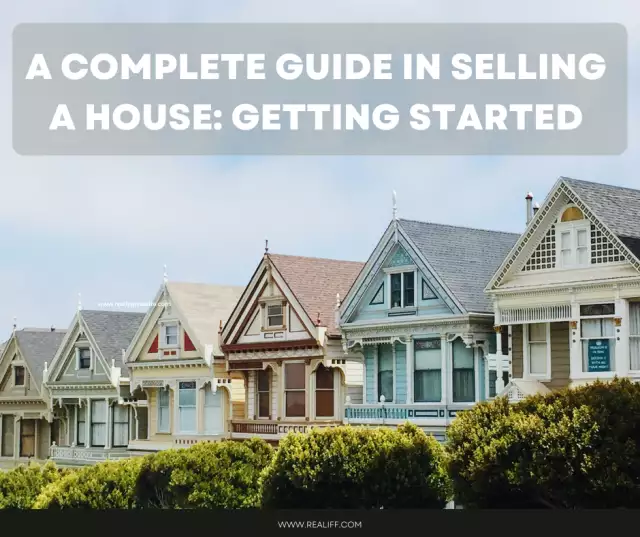A complete guide in Selling a House: Getting Started
The majority of people who are selling a house fantasize about having a transaction go off without a hitch, in which they merely have to put their property on the market, find a qualified buyer promptly, get payment, and then turn over the keys. in addition, sometimes they ask How to Sell My House Fast. The fact is that selling a house involves a lot of different moving components, some of which you can control and some of which you have no influence over.
For instance, the location of your home might affect how long it stays on the market and how much of a profit margin you can justify adding to the asking price. If there is a lot of competition in an area and not many buyers, you'll likely be able to charge a higher price and sell your property more quickly. On the other hand, homeowners in regions where there has been a slowdown in the selling of homes will likely have a more difficult time finding a buyer who meets their needs.
Over the past two years, there has been an increase in pricing and bidding wars, in addition to exceptionally low levels of inventory, as a result of the extraordinary expansion in the housing market that has occurred since the coronavirus outbreak. On the other hand, as mortgage rates begin to climb and prices start to stabilize, it is anticipated that the market will begin to calm down a little bit.
As a result, if you want to maximize your profits as a seller, you need to be well-prepared and in control of the aspects that might have a significant influence on your bottom line. Things like hiring a fantastic real estate agent and doing everything you can to boost the appeal of your house online may result in a more streamlined closing process and more money in your bank account. Realiff provides this situation for you to enjoy selling a house.
We'll break down the essential steps for selling a house, so you can win over buyers and sell it for the most money – without losing your cool.
1. Hire an agent who is familiar with the market
Realiff makes it simple to investigate a real estate agent's sales history and professional credentials, allowing you to select the best individual to deal with by giving you the information you need to make an informed decision. Look up the web profiles of different real estate agents to find out how long they've been in the business, how many transactions they've closed, and what kind of certifications they could have. Please pay close attention to the manner in which they sell their listings, as well as the locations at which they do so, and whether or not they employ professional photographs. When it comes to a real estate transaction, the listing agent is the one who is ultimately accountable for representing the seller in the selling a house process. This includes marketing the home, compiling a list of its features, and doing price research through a comparative market study.
Some homeowners may be tempted to sell a house without a realtor to avoid having to pay a commission. This practice is referred to as "home for sale by owner," or FSBO for short. The amount of money that sellers stand to save by avoiding such fees can be in the thousands of dollars, which is typically between 5 and 6 percent of the overall transaction price.
However, a professional agent puts in a lot of work to justify the cost of their services in selling a house. For instance, they may advertise your home to the widest potential audience and negotiate on your behalf in order to bring in the highest possible bids. If you go it alone, you will be responsible for all aspects of the sale, including preparing and promoting your house, evaluating bids from potential purchasers, and managing all aspects of the negotiations and closing process.
It is important to remember that the costs associated with real estate transactions are currently at an all-time low when you deal with an agent and negotiate a commission. Therefore, there is a chance that you will be given a break at the closing table.
Your real estate agent may want you to sign a listing agreement before they would show your house to prospective buyers. This contract, in essence, grants your listing agent license to locate a buyer for your property and emphasizes their percentage on the purchase. Before putting pen to paper, you should ensure that you have performed all of the necessary research, including asking for recommendations, reading reviews written by previous sellers, and conducting an interview with the agent.
The mission of Realiff is to assist clients in finding a suitable real estate agent at the most competitive commission rate.
2. Establish a timetable for selling a house
The process of selling a house is a huge operation that may take anywhere from two to four months, or perhaps much longer, depending on the circumstances of the local market and the quantity of inventory that is currently on the market.
As soon as you decide to sell a home, you should immediately begin your search for a real estate agent that has the appropriate level of experience for your particular circumstance.
Consider scheduling a pre-sale home inspection at least two or three months before you want to offer your house for sale (more on that below!) to detect any problem areas, particularly structural or mechanical concerns that may need to be addressed in order to enable a sale of your property. Make sure you leave yourself enough time to schedule any required repairs.
Start preparing your home for photographs by staging it and giving it a thorough cleaning around one month before you want to put it on the market.
Before you put your house up for sale, here is a checklist of things you should do:
- Conduct research and discussions with several real estate agents.
- Eliminate clutter and consider placing unwanted stuff in a storage unit.
- Identify any potential problems with your house by investing in an optional home inspection.
- If repairs are required, schedule them.
- Deep clean.
- Set the stage in the house.
- Have your pictures shot by a professional.
3. Have inspected a house before you put it up to sell
A pre-sale house inspection is not required, but it is strongly recommended since it can be a worthwhile investment up front. If you are selling a house, you should have a full inspection report completed so that any structural or mechanical issues may be uncovered. It may cost a few hundred dollars, but it will inform you of flaws that purchasers would likely highlight when they undertake their own inspection later in the process. In other words, it will save you money in the long run.
It is possible for sellers to speed up the selling process by doing repairs in conjunction with other house preparation work. This will put the seller a few steps ahead of the buyer. This indicates that the house should be ready to sell, with no complications and on time, by the time it is placed on the market.
4. Do not waste your money on unnecessary changes.
If you make expensive renovations, you should ensure that the modifications you make have a good return on investment before you spend the money. Installing new granite countertops, for instance, if you will only be able to break even or even lose money on them, is a decision that should be avoided at all costs. In addition, you may not need to make these enhancements to sell a house for the highest possible price, particularly if there is a scarcity of homes in your region.
This is where the assistance of a qualified real estate agent may be of great use to you in selling a house. They frequently know what people anticipate in your region and may assist you in planning upgrades following those expectations. If consumers in the area are not interested in purchasing a super skylight or a steam shower, then including these features would be a waste of time and money. Typically, low-cost strategies to make a wonderful first impression include:
- Applying a new coat of paint in a neutral color.
- Replacing the carpet.
- Sprucing up the outside space.
In most cases, the biggest return on investment may be made from improvements to the kitchen and bathrooms. If you have older cabinetry, you might be able to get a more modern appearance by only replacing the cabinet doors and hardware. For instance, if you want to upgrade your kitchen cabinets but don't want to spend a lot of money, you may change the doors to something more modern and Shaker-style over the weekend.
5. Have your pictures taken by a professional
You should coordinate with your real estate agent to set up a time for a photographer before selling a house to take promotional images of your property. It is essential to take photographs of high quality because increasing the allure of your house online might be the deciding factor in whether or not it sells quickly or remains on the market for an extended period.
Professional photography and interactive internet tours are two of the services some real estate brokers provide as part of their overall package. If they don't provide photography services, on the other hand, you could want to look for one on your own. The cost of having a professional photograph your house will differ depending on the size of your property, its location, and the time it takes to photograph the home.
A skilled professional photographer with an extensive portfolio understands how to make interior spaces look more spacious, brighter, and appealing to the viewer. The same principle applies to your lawn and other outside spaces. Homebuyers might be dissuaded from buying a home before they ever get the chance to read about the wonderful bike path nearby or the brand new roof you just had put in the web photographs that are being used for marketing the house are poorly lit.
6. Start the process of selling a house
The following are some suggestions to help you make your house ready for the market, so increasing the likelihood of a quick selling a house:
Pay attention to how appealing the house seems online
You're certainly familiar with the term "curb appeal," but industry experts argue that "internet appeal" is now much more crucial. The first showing of your property is going to be online. The caliber of your website's presentation will influence whether a potential customer dials your number, schedules an appointment, or moves on to the next listing.
Prepare it for showings by staging it and maintaining its cleanliness
It is common practice for real estate brokers to recommend that sellers stage their properties before putting them on the market. This is one of the most important processes of selling a house. The term "home staging" refers to the process of preparing a house for sale by rearranging its rooms to improve traffic flow and functionality, as well as eliminating any unnecessary furniture, personal possessions, or ugly things from the property. Investing in a professional stager might help you stand out from the competition if you are selling a luxury house or in a sluggish market. According to HomeAdvisor, the national average cost of professional home staging is around $1,200; however, rates can range anywhere from approximately $500 to $2,000 for staging services.
The house should be shown by someone else
When prospective purchasers arrive to look at your home, you should try to disappear. Permit them to see themselves in the setting, unhindered by the thought of having to interact with you or other people. When seeing your house, prospective buyers will typically be accompanied by their real estate agent. You can also ask your agent to accompany you during showings.
According to Grant Lopez, a Realtor with KW Heritage and a past chairman of the San Antonio Board of Realtors in Texas, "in selling a house process, Seeing the existing homeowner lurking might induce purchasers to be cautious to share their thoughts." It may prevent them from really considering your house as an option.
7. Set a reasonable pricing
Even in areas where there is a lot of competition, buyers don't want to spend more than what the comparables, often known as "comps" reveal, which is why it's so important to set the price correctly in selling a house. When you overestimate the worth of a house, you run the risk of losing money. Still, when you underestimate it, you run the risk of losing money.
Consult the comparable homes in your community to determine an appropriate starting price for your property. These data sheets contain information on recently sold real estate in a certain area. At a glance, you'll be able to obtain a sense of the prices at which properties in your immediate area are selling.
According to Lopez, "one of the most common mistakes sellers make is selling a house too high and then decreasing it at repeated intervals." "There are some sellers who believe that utilizing this strategy would result in the biggest return. On the other hand, this is not always the case in real life. Properties priced excessively high can discourage prospective purchasers, many of whom will not even bother to investigate the home further.
In addition, properties that have had their prices reduced more than once may give potential buyers the idea that there is something wrong with the quality of your property or that it is not attractive. Therefore, it is preferable to prevent the need for frequent price reductions by pricing your house from the beginning in such a way that it will attract the largest possible pool of purchasers.
8. Consider and discuss the various proposals
As soon as potential purchasers have had a chance to view your house and it has been placed on the market officially, you should start receiving bids on it. In a situation like this, the greatest advocate and go-to source for guidance is a real estate agent (or an attorney, for that matter)in selling a house. Buyers will most likely make an offer at or over the asking price if the market in your area is competitive and tilts in favor of sellers. You could even get numerous bids. On the other hand, if sales are slow where you are, and you don't get many offers, you might have to be willing to negotiate the price of your property to get it sold.
When you are presented with an offer, you can either accept it in its current form, submit a counteroffer, or decline it altogether.
A response to an offer that involves negotiating the terms and price of the offer is known as a counteroffer. When making a counteroffer, you should always put it in writing and give the buyer a limited amount of time (no more than 48 hours) to react to it. You may, for instance, provide a credit toward the cost of new paint and carpet. Still, you might also insist on maintaining the initial asking price. Alternatively, you may try to sweeten the bargain by offering to leave some equipment behind.
If you are fortunate enough to receive more than one offer, you might feel compelled to just accept the one that is the highest. However, in selling a house, you should also carefully consider the following additional features of the offer:
- Means of monetary exchange (cash versus financing)
- Method of financial support
- The amount of the down payment
- Contingencies
- Questions about credits or the individual property
- The date of termination suggested
Be aware that an appraisal of the property is required if the buyer intends to rely on the financing provided by a lender. The difference between the purchase price and the property's appraised worth will need to be made up in some other way, or the transaction risks failing.
9. Anticipate seller closing expenses
Closing fees are paid by both the homebuyer and the house seller. The commission paid to the real estate agent is often between 5 and 6 percent of the price of selling a house and is customarily paid by the person selling a house.
Other fees, which the seller typically pays in selling a house, include the following:
- Government transfer tax
- Recording costs and fees
- Outstanding liens
- Payments to attorneys
In addition, the seller is obligated to pay the buyer's agreed credits to be paid at the time of closing for repairs or closing fees if the buyer negotiates those credits. At the closing time, either your real estate agent or the closing agent should give you a comprehensive list of the charges that will be your responsibility. Be aware that though the buyer is responsible for most of the closing charges, ranging from 2% to 4% of the sale price, you may still be required to pay some of the fees associated with the transaction.
10. Consider the repercussions of the tax system
The good news in the selling a house process is that many homeowners who sell their primary residence won't have to pay taxes on the earnings they make from selling their property. If you have owned and lived in your house for at least two out of the five years before selling a house, then you will not be required to pay taxes on any profit up to the amount of $250,000 you make from the sale. A married couple can deduct from their taxes to $500,000 if they file jointly. However, suppose your profit from the house sale is higher than that amount. In that case, you are required by law to declare the excess amount to the IRS as a capital gain on your tax return.
11. Compile all of the essential documents to finish
Selling a house requires a significant amount of documentation to be properly documented. Put everything in its proper position so you can move things forward more swiftly. The following are some of the most important papers that you will need to collect for selling a house:
- The original purchase contract for your house
- Survey of the property, a certificate of occupancy, and certifications stating compliance with any applicable municipal ordinances
- Mortgage documents
- Accounting records
- Evaluation based on the acquisition of your property
- Insurance for homeowners of a home
- Report from a home inspection, assuming you had one
12. Give some thought to retaining a real estate attorney
Several states do not mandate that sellers attend the closing of their property with a real estate attorney. The cost of hiring one may be a couple of thousand dollars. Still, considering the need to protect such a significant financial transaction, the expenditure might be justified. (This is especially important if you sell your property yourself.)
A lawyer may assist with filling out paperwork, reviewing contracts and other papers, identifying potential problems, and making sure the transaction proceeds in selling a house as smoothly as it possibly can. An attorney would also be able to identify title problems that might prevent the sale of your property for several weeks or months or perhaps completely derail the transaction, such as the following issues:
- Outstanding liens or judgments
- Trust concerns
- amounts owed on mortgages
- Tax problems
- Encroachments
How much time does selling a house typically take?
Give yourself two months to become ready
Suppose you are considering selling a house and your moving timetable can accommodate it. In that case, you should give yourself at least two months before you list it to finish making all necessary preparations.
Give it a month to see if you get an offer
You should anticipate getting offers within the first month of listing your property. However, the exact timing of selling a house may vary depending on the market status in your area. When measured from the day a property is placed for sale to the day the sale is closed, Realiff Research estimates that the typical home in the United States will be on the market for between 55 and 70 days in 2020. In 2020, residences were sold on average 25 days after being listed for sale, a decrease from the 30 days it took in 2019.
Selling a house fast by Realiff
Realiff is the market-leading fast house buying company in the Us. We buy any house and promise to make you a cash offer for your property regardless of its condition or location. So if you need to sell your house fast, Realiff is here to help you in selling a house. We have the cash ready to buy your house quickly, with no chain or fuss. Our wealth of experience and expertise in selling a house allows us to offer you the optimum sell house fast service. Unlike most other we buy home companies, we construct our offer by performing dedicated research into the property, its surrounding area, and local amenities to provide the most competitive fast cash offer for your property. Our customers use our sell-a-house fast service for its convenience and flexibility – and Realiff truly buys any house, in any condition and location within the US, within a timescale that best suits you.





